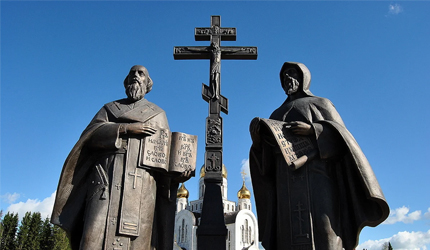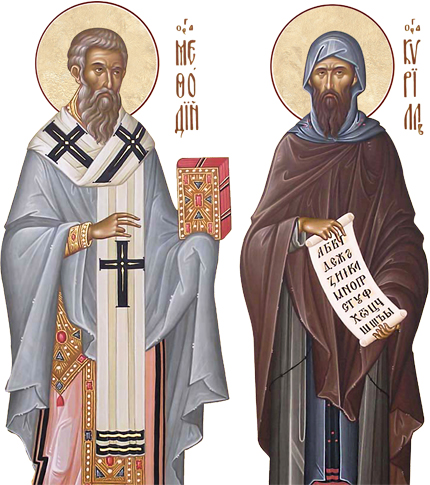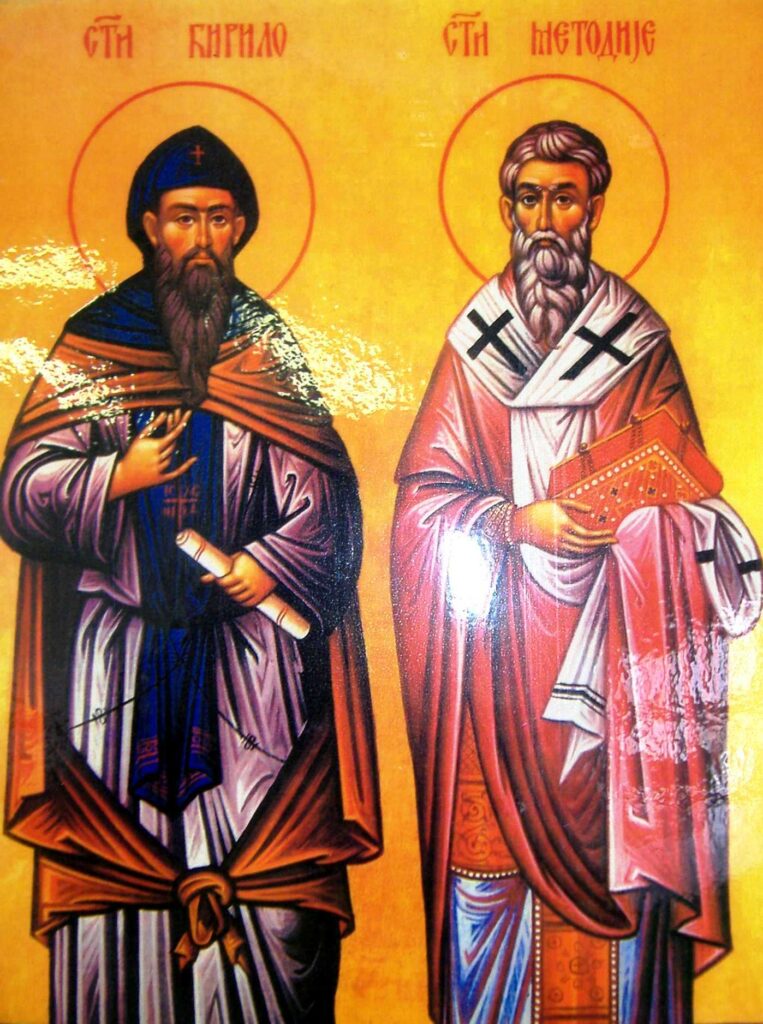Every May 24th, Orthodox Christians honor two extraordinary brothers whose legacy shaped the spiritual and cultural identity of the Slavic peoples—Saints Cyril and Methodius. Known as the “Apostles to the Slavs,” these holy brothers from Thessaloniki brought not only the Christian faith but also the gift of literacy to millions.
Who Were Saints Cyril and Methodius?
Cyril (born Constantine in 826) and Methodius (born between 815 and 820) were Greek brothers from the city of Thessaloniki, born to devout parents—Leontius, a Byzantine military commander, and Maria, of Slavic descent. Living in a city surrounded by Slavs, they grew up fluent in the local Slavic dialect, which would later prove essential in their mission.
Cyril, a brilliant scholar, was educated in Constantinople and served as a librarian at the famous Hagia Sophia. He also taught philosophy and was chosen to represent the Byzantine Empire in diplomatic and theological missions, including a famous debate with Muslim scholars in Samarra.
Methodius, on the other hand, started his career as a governor in Macedonia before becoming a monk on Mount Olympus in Asia Minor. Later, he too dedicated his life to serving the Church.

The Mission: Christianizing the Slavic Peoples
In 862, the Prince of Great Moravia, Rastislav, asked the Byzantine Emperor for missionaries who could preach Christianity in the Slavic tongue. The Emperor and Patriarch Photios sent the most qualified candidates—Cyril and Methodius.
Before setting out, Cyril devised the first Slavic alphabet—Glagolitic, from which the Cyrillic script (named in his honor) later evolved. With it, the brothers translated the Bible and liturgical books into the language of the people, allowing Slavs to worship in their native tongue—a revolutionary act in a time when Latin, Greek, and Hebrew were seen as the only acceptable liturgical languages.
Facing Trials and Triumphs
Their success in spreading Christianity and literacy was met with fierce opposition from Latin-speaking clergy, who clung to the “Trilingual Heresy”—the belief that worship was only valid in Hebrew, Greek, or Latin. Cyril and Methodius were even expelled from Moravia and had to travel to Rome to seek support.
There, Pope Hadrian—still Orthodox at the time—approved their work and celebrated the use of the Slavic language in worship. Cyril, however, fell ill and died in Rome in 869. He was buried in the Basilica of Saint Clement, where his tomb is still venerated by Slavic pilgrims today.

Methodius Carries On
After Cyril’s death, Methodius continued their mission. He was ordained Archbishop of Pannonia and tirelessly worked to preserve the Slavic liturgy and strengthen the local Church. Despite continued political and ecclesiastical opposition, he remained steadfast until his death in 885.
Their Enduring Legacy
Saints Cyril and Methodius not only evangelized a people—they laid the foundations of Slavic Christian culture. Their disciples—Saints Clement, Naum, Angelar, Sava, and Gorazd—carried on their work, establishing schools and continuing the translation of sacred texts.
Their influence is felt across Eastern Europe: Russians, Bulgarians, Serbs, Slovaks, Czechs, Croats, Slovenes, and Poles all trace the roots of their literacy and faith to these holy brothers. Because of their enormous contribution, they are rightfully called the Enlighteners of the Slavs and Equal-to-the-Apostles.
Liturgical Praise and Commemoration
On their feast day, Orthodox hymnography praises them as:
“Equal to the Apostles in life and teachers of the Slavic lands, O godly-wise Cyril and Methodius, pray to the Lord of all to strengthen the Orthodox peoples and grant peace to the world and great mercy to our souls.” (Troparion)
“We honor the two sacred enlighteners who, by translating the divine books, poured out the knowledge of God, from which we still draw abundantly. We glorify you, Cyril and Methodius, who now stand before the throne of the Most High and fervently intercede for our souls.” (Kontakion)

Why Their Legacy Matters Today
In a world where language is often a barrier, Saints Cyril and Methodius stand as symbols of inclusion, education, and unity. They broke down cultural walls not with weapons or force, but with love, learning, and liturgy.
Their lives remind us that true enlightenment comes through service, humility, and a heart set on God.
May we honor their memory not only with words, but by striving—like they did—to bring light, truth, and understanding to all.

